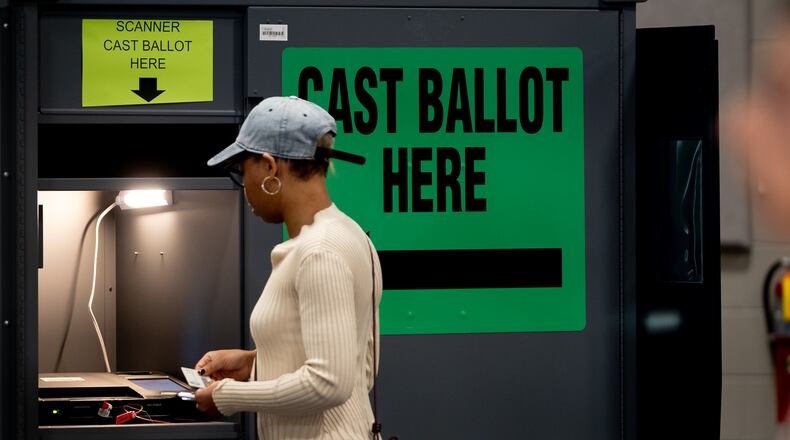Despite finishing a distant third on election night, Tracey Verhoeven does not regret her whirlwind campaign for Congress. And she might even try again in 2026, albeit not as a write-in candidate and with longer than six weeks to make her pitch to voters.
About 3% of voters in Georgia’s 11th Congressional District wrote in Verhoeven’s name, far behind the 32% who voted for the person who won the Democratic primary, Katy Stamper, and the 67% who supported reelecting Republican U.S. Rep. Barry Loudermilk.
Verhoeven became Democrats’ candidate of choice after party activists determined Stamper was politically aligned with the far right. Stamper tempered some of her more controversial beliefs during the primary season, and her problematic affiliations didn’t become widely known until after she won the May primary.
Credit: Courtesy photos
Credit: Courtesy photos
Write-in campaigns are rarely successful, with voters more likely to choose among the candidates whose names are printed on the ballot. The 11th District runs from Smyrna north to Adairsville, includes Bartow, Gordon and Pickens counties and parts of Cherokee and Cobb counties, and is conservative-leaning. That means Democratic candidate are unlikely to get a majority of votes even in the best of scenarios.
So, in some ways, Verhoeven is grateful that thousands of people wrote in her name.
“I had so many supporters. I would be done with a speech, and there’d be people surrounding me wanting to meet me and talk with me,” Verhoeven said about her abbreviated campaign. “It was just a humbling, loving, wonderful experience.”
The campaign was the brainchild of Amy Powers, who became troubled by Stamper after hearing her stump speech, which included antitransgender rhetoric, at an event in Cherokee County. Powers is the mother of a trans child.
“I was appalled by what she was saying, and I’m a kind of a mama bear,” Powers said. “So my next thing was, how are we going to stamp Stamper out?”
Right after the primary, Democratic activist Seth Taylor had a tweet go semiviral when he dug into Stamper’s background. Others followed. Despite winning that two-way race, Stamper’s views toed much closer to those of the far right on immigration, LGBTQ+ rights and guns, many Democrats said.
The party could not prevent Stamper from running as a Democrat once she paid her money during qualifying, and it could not kick her off the ballot once she won the primary even after it became convinced her politics did not align with the party’s platform. However, Democrats threw their support behind Verhoeven.
They helped Verhoeven set up a congressional campaign and received permission for her to fundraise on ActBlue, the online platform of choice for Democrats. They used social media to get the word out about her candidacy and how to spell her name.
Taylor said party leaders and activists can do a better job researching candidates and letting the public know what they find. He pointed to another example in Albany where the former chair of the Dougherty County GOP ran this year as a Democrat for a state House seat.
“It just shows you that Republicans are taking advantage of our open primary system here in Georgia,” Taylor said.
Kevin Olasanoye, executive director of the Democratic Party of Georgia, said the party trusts that voters can and will do their own homework.
“The DPG supports Democrats across the state who have won their primaries, and we trust that our primary electorate is capable of vetting the candidates who are asking for their votes,” Olasanoye said in a statement. “When a candidate misleads voters to pass that vetting, Democrats have a mechanism to disavow a nominee who does not represent our party’s values — which was used by Democrats in the 11th District.”
About the Author







